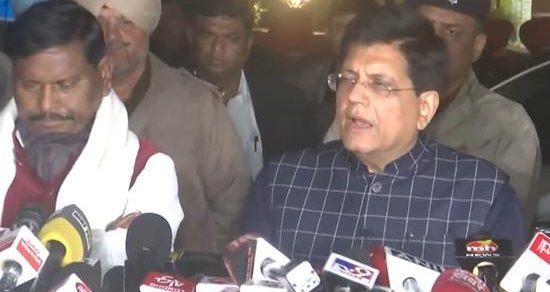Amid the persisting farmer agitation, a significant breakthrough emerged as three Union ministers unveiled a proposal aimed at diversifying agricultural activities into pulses, cotton, and maize during the latest round of discussions with farmer representatives. The pivotal meeting, which convened on Sunday, saw the participation of Chief Minister Bhagwant Singh Mann, marking a crucial step towards resolving the impasse.
Commerce and Industry Minister Piyush Goyal disclosed that the government proposed that cooperatives such as NAFED and NCCF engage in five-year agreements with farmers to procure pulses at Minimum Support Price (MSP). Furthermore, the government suggested that the Cotton Corporation of India enter into similar agreements with farmers for the procurement of cotton crops at MSP.
This proposal seeks to provide assurance to farmers regarding MSP with no restrictions on quantity, addressing a key concern voiced by the agricultural community. A 14-member delegation representing farmers from various states, including Punjab, Haryana, Rajasthan, Karnataka, and Delhi, requested time until Tuesday to deliberate on the proposal before offering their decision.
Minister Goyal described the discussions, which lasted over four hours, as “positive,” emphasizing the innovative solutions explored and the imperative of diversification to tackle challenges like desertification and water scarcity in Punjab.
Under the proposal, cooperative societies like NAFED would engage in five-year contracts with farmers, guaranteeing purchases at MSP without quantity constraints. Additionally, the involvement of the Cotton Corporation of India could ensure the procurement of cotton at MSP, providing a safety net for farmers.
Chief Minister Mann expressed support for diversification, highlighting its potential to enhance farmers’ income and reduce dependence on imports. However, he underscored the necessity of ensuring profitability comparable to paddy cultivation to incentivize farmers.
Meanwhile, farmer leaders reiterated their demand for legislation guaranteeing MSP and raised concerns about the calculation of production costs. The continued backing for the “Dilli Chalo” protest and planned demonstrations at the residences of political leaders underscored the farming community’s determination to advocate for their demands.
As deliberations persist, attention is focused on the farmers’ decision regarding the proposed diversification plan, with hopes high for a resolution to the prolonged standoff between the government and agricultural stakeholders.
